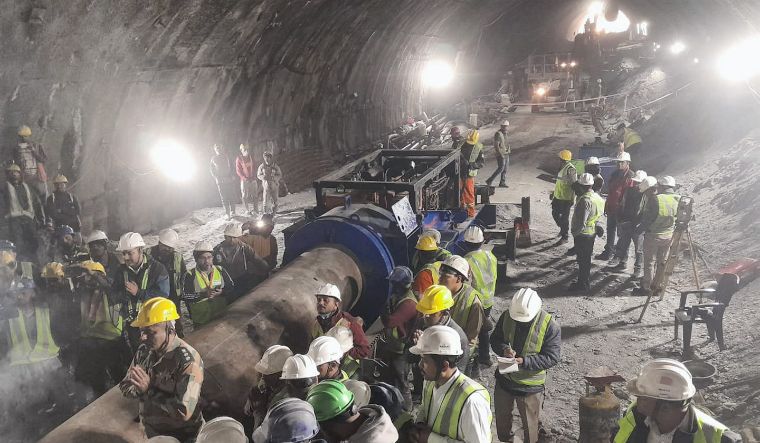The rescue operations to create an escape passage for labourers stuck inside the collapsed Silkyara tunnel at Uttarkashi in Uttarakhand entered day five on Friday. The drilling to insert 800 mm and 900 mm diameter pipes one after the other with the help of a giant drill machine continued overnight, said officials.
So far, the powerful American auger machine has managed to drill up to 21 metres through the rubble. As of Thursday evening, a six-metre section of a steel pipe has been inserted into the bored passage and work to welde in the remaining pipes continues.
"Drilling has been done up to 21 metres so far," the state emergency operation centre's control room in Silkyara said. The stretch where debris is accumulated begins 270 metres from the mouth of the tunnel at the Silkyara side.
Authorities said the trapped workers are safe and being supplied with oxygen, medicines, food and water through pipes. Constant communication is being maintained with them to keep up their morale, he said. Experts from Norway and Thailand were consulted about the rescue operations, considering the geography of the tunnel.
Meanwhile, doctors have expressed concern about the mental and physical stress the incident could put on the trapped workers. They believe survivors would need physical and mental rehabilitation.
"The victims might experience panic attacks because of being trapped in closed spaces for long," said Dr Ajay Agarwal, director, Internal Medicine, Fortis Hospital, Noida. "Further, the ambient conditions such as oxygen and carbon dioxide levels too could impact their physical health and prolonged exposure to cold underground temperatures could possibly cause hypothermia and make them fall unconscious," Agarwal told PTI.
Agarwal said the situation might worsen for the workers who have chronic health problems, such as diabetes or heart disease, even as the regular supply of food and water might sustain them physically and prevent dehydration.
However, the food and water supply, along with physically supporting the trapped victims, is likely to provide them with a psychological boost and send a message that "help is not far", the doctor said. "This could reduce anxiety levels and decrease the chances of ketosis," he added.










